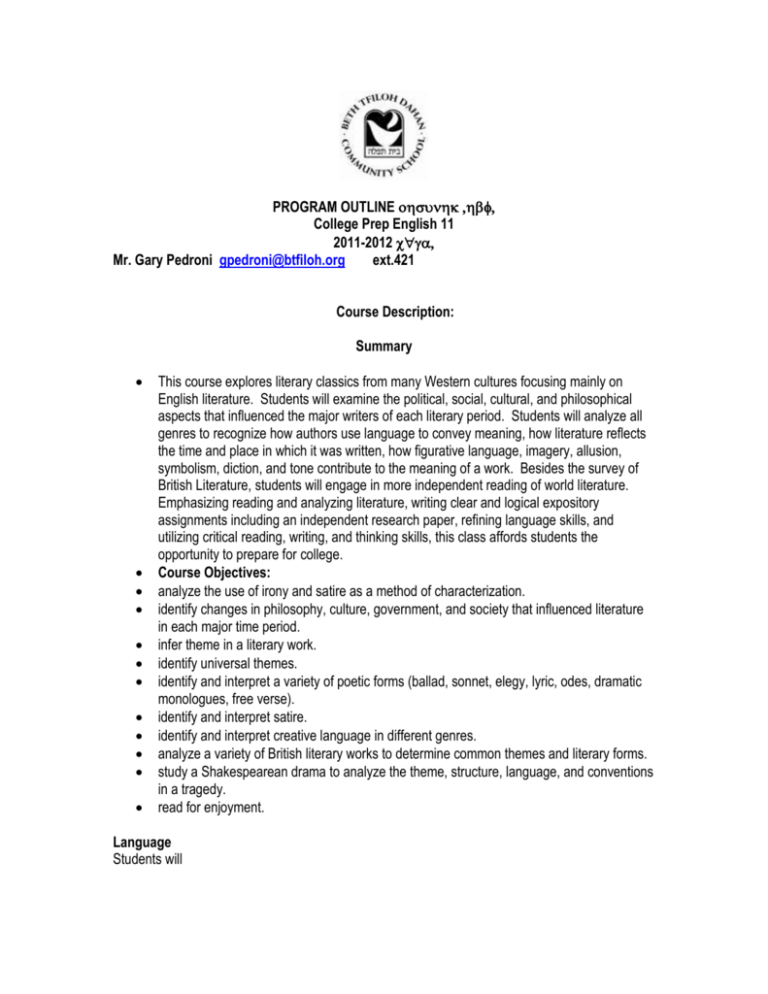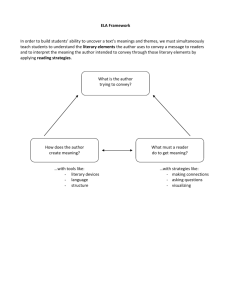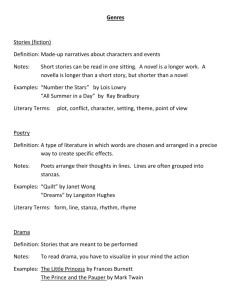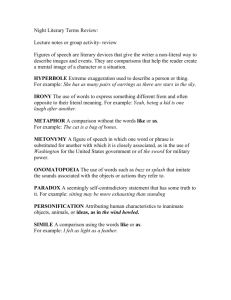PROGRAM OUTLINE College Prep English 11 2011
advertisement

PROGRAM OUTLINE College Prep English 11 2011-2012 Mr. Gary Pedroni gpedroni@btfiloh.org ext.421 Course Description: Summary This course explores literary classics from many Western cultures focusing mainly on English literature. Students will examine the political, social, cultural, and philosophical aspects that influenced the major writers of each literary period. Students will analyze all genres to recognize how authors use language to convey meaning, how literature reflects the time and place in which it was written, how figurative language, imagery, allusion, symbolism, diction, and tone contribute to the meaning of a work. Besides the survey of British Literature, students will engage in more independent reading of world literature. Emphasizing reading and analyzing literature, writing clear and logical expository assignments including an independent research paper, refining language skills, and utilizing critical reading, writing, and thinking skills, this class affords students the opportunity to prepare for college. Course Objectives: analyze the use of irony and satire as a method of characterization. identify changes in philosophy, culture, government, and society that influenced literature in each major time period. infer theme in a literary work. identify universal themes. identify and interpret a variety of poetic forms (ballad, sonnet, elegy, lyric, odes, dramatic monologues, free verse). identify and interpret satire. identify and interpret creative language in different genres. analyze a variety of British literary works to determine common themes and literary forms. study a Shakespearean drama to analyze the theme, structure, language, and conventions in a tragedy. read for enjoyment. Language Students will employ appropriate language choices and conventions of usage, mechanics, and grammar to write and speak effectively to a given audience. incorporate a variety of sentence structures in all writing. edit his/her writing to eliminate wordiness. Students will also write a literary research paper that focuses on a single author. Skills Covered: Students Will identify narrative elements and poetic devices in a poem. analyze the use of irony and satire as a method of characterization. identify changes in philosophy, culture, government, and society that influenced literature in each major time period. infer theme in a literary work. identify universal themes. identify and interpret a variety of poetic forms (ballad, sonnet, elegy, lyric, odes, dramatic monologues, free verse). identify and interpret satire. identify and interpret creative language in different genres. analyze a variety of British literary works to determine common themes and literary forms. study a Shakespearean drama to analyze the theme, structure, language, and conventions in a tragedy. read for enjoyment. Language Students will employ appropriate language choices and conventions of usage, mechanics, and grammar to write and speak effectively to a given audience. incorporate a variety of sentence structures in all writing. edit his/her writing to eliminate wordiness. Writing Students will use a variety of literary approaches (historical, biographical, philosophical, and sociological) to compose a literary essay on a selected British work. use the internet to conduct research. prepare note cards and works cited page for research projects. write a topic sentence outline for a research project. compose restricted thesis statements. write paragraphs that focus on a single topic. use appropriate transitions within and between paragraphs. write effective introductions and conclusions. practice effective editing/proofreading skills. paraphrase appropriately information for essays and research paper. compose a poem on a chosen topic in a selected form. state a position, refute arguments of the opposition, and develop reasons in a logical pattern to write a persuasive essay. write creatively in various formats. Vocabulary Students will Course Objectives: Students will 1. prepare for the SAT 2. develop an appreciation of British/World Literature 3. organize formal essays in a clear, concise manner demonstrating variety in sentence structure and mature word choices 4. write creatively to express personal ideas infer the meanings of words in context. examine the etymological development of modern English. use appropriate vocabulary in written assignments. practice SAT sentence completions in class drills. Course Text: Literature and the Language Arts, The British Tradition. Second Edition. Saint Paul Minnesota: EMC Paradigm, 2005. EXPECTATIONS AND REQUIREMENTS: Grading Policy 1. Rubrics used for formal as well as creative writing assignments are located online. 2. Students are expected to participate positively in classroom activities. Positive class work may result in a half letter grade increase on final trimester grades. 3. All work should be completed on time. Students receive 4 late passes to use without a penalty when an emergency occurs. All other work submitted late will accrue a penalty of one letter grade per school day. 4. No assignments should be emailed to me unless the student is absent the day the assignment is due. 5. Poor attendance may affect a trimester grade negatively. 6. To apply new skills and to improve writing habits, students may be allowed to rewrite some written assignments. Rules and restrictions for rewrites will be given at a later date. 7. Any student who is experiencing difficulties in class should see me ASAP to develop a plan to improve his/her performance. Academic Integrity In keeping with the goals set out in our mission statement, to promote the moral and ethical development of our students, we seek to create an ethical environment in which students demonstrate integrity in all areas of their lives. We also recognize that it is our responsibility to prepare students for the practical challenges of contemporary society, which include consequences for dishonest or unethical behavior on college campuses and in the work world. For our entire Academic Integrity Policy, see our Parent Handbook. Homework Students must complete all homework independently unless otherwise indicated. All student assignments will be posted in class. Grading Homework 20% Class work 20% Essays/ Quizzes/Tests/Presentations 60% Readings: (Tentative) Beowulf Canterbury Tales by Chaucer Hamlet by William Shakespeare The Mayor of Casterbridge by Thomas Hardy Hard Times by Charles Dickens The Importance of Being Earnest by Oscar Wilde Brave New World by Aldous Huxley Lord of the Flies by William Golding Selected Essays by George Orwell Selected Poetry









